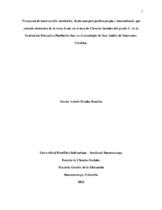| dc.contributor.advisor | Silva Camelo, Oscar Eduardo | |
| dc.contributor.author | Peralta Rondón, Duván Andrés | |
| dc.coverage.spatial | Bucaramanga | spa |
| dc.coverage.temporal | 2022 | spa |
| dc.date.accessioned | 2024-09-05T16:59:32Z | |
| dc.date.available | 2024-09-05T16:59:32Z | |
| dc.date.issued | 2022 | |
| dc.identifier.uri | http://hdl.handle.net/20.500.11912/11968 | |
| dc.description | 129 páginas | spa |
| dc.description.abstract | El siguiente trabajo de investigación, diseño una intervención al currículo de la Institución Educativa
Pueblecito Sur, en el área de Ciencias Sociales del grado 3°, articulando los saberes propios de la etnia Zenú y
los referentes propuestos por el (Ministerio Nacional de Educación [MEN]). Desde la cosmovisión de los
pueblos indígenas de Colombia, se entiende la educación propia “como ente generador de consolidar la
autonomía como cimiento de identidad y desarrollo de las culturas indígenas, buscando permanentemente la
construcción de paz y el desarrollo social” (Giraldo y Taborda, 2020, p. 4). La metodología de esta
investigación es de corte cualitativo de tipo etnográfico, cuya fuente de información reside en el análisis de
documentos, observaciones de contexto y entrevistas. Esto con el fin de conocer las costumbres, contenidos,
modelos de enseñanza y sistematizar de alguna manera lo no documentado, describiendo así, la realidad del
contexto escolar estudiado. Desde la Constitución Política de 1991, en Colombia les han dado la facultad a los
pueblos indígenas para construir sus currículos propios. Con base en esto, la (Comisión Nacional de trabajo y
Concertación de la Educación para los Pueblos Indígenas [CONTCEPI]), que representa los pueblos indígenas
de Colombia, logró construir los componentes del (Sistema de Educación Indígena Propio [SEIP]),
sustentando que es la manera de mantener y fortalecer la identidad cultural de los pueblos indígenas a través
del (Proyecto Educativo Comunitario [PEC]) (CONTCEPI, 2012, p. 64). La importancia de innovar en
educación, forma parte de la necesidad de mejorar los procesos de enseñanza-aprendizaje a través de la
práctica docente, debido a la occidentalización de los currículos en los establecimientos educativos, de ahí se
plantea una propuesta que posibilite la implementación de una educación propia e intercultural en un ambiente
armónico, fortaleciendo el pueblo Zenú frente a la diversidad de un contexto nacional pluricultural. | spa |
| dc.description.abstract | The following research work will design an intervention in the curriculum of the Pueblecito Sur
Educational Institution, in the area of Social Sciences of grade 3, articulating the knowledge of the Zenú
ethnic group and the references proposed by the (National Ministry of Education [MEN]). From the
worldview of the indigenous peoples of Colombia, self-education "as a generating entity to consolidate
autonomy as the foundation of identity and development of indigenous cultures, permanently seeking the
construction of peace and social development" (Giraldo and Taborda, 2020, p. 4). An ethnographic
qualitative research methodology is proposed, whose source of information lies in document analysis,
context observations and interviews. This in order to know the customs, contents, teaching models and
systematize in some way the undocumented, thus describing the reality of the school context studied.
Since the 1991 Political Constitution, in Colombia they have given the power to indigenous peoples to
build their own curricula. Based on this, the (National Commission of Labor and Concertation of
Education for Indigenous Peoples [CONTCEPI]), which represents the indigenous peoples of Colombia,
managed to build the components of the (Own Indigenous Education System [SEIP]), arguing that it is
the way to maintain and strengthen the cultural identity of indigenous peoples is through the (Community
Educational Project [PEC]) (CONTCEPI, 2012, p. 64). The importance of innovating in education is part
of the need to improve teaching-learning processes through teaching practice, due to the westernization of
curricula in educational establishments, hence a proposal is proposed that allows the implementation of
their own intercultural education in a harmonious environment, strengthening the Zenú people in the face
of the diversity of a multicultural national context. | en |
| dc.format.mimetype | application/pdf | spa |
| dc.language.iso | spa | spa |
| dc.rights | Attribution-NonCommercial-NoDerivatives 4.0 Internacional | * |
| dc.rights.uri | http://creativecommons.org/licenses/by-nc-nd/4.0/ | * |
| dc.subject | Maestría en Gestión de la Educación | spa |
| dc.subject | Educación propia | spa |
| dc.subject | Interculturalidad | spa |
| dc.subject | SEIP | spa |
| dc.subject | Diseño curricular | spa |
| dc.subject | Identidad cultural | spa |
| dc.title | Propuesta de intervención curricular, desde una perspectiva propia e intercultural, que articule elementos de la etnia Zenú, en el área de Ciencias Sociales del grado 3°, de la Institución Educativa Pueblecito Sur, en el municipio de San Andrés de Sotavento, Córdoba | spa |
| dc.type | Tesis de Maestría | spa |
| dc.publisher.department | Escuela de Ciencias Sociales | spa |
| dc.publisher.program | Maestría en Gestión de la Educación | spa |
| dc.rights.accessRights | openAccess | spa |
| dc.type.hasVersion | publishedVersion | spa |
| dc.description.sectional | Bucaramanga | spa |
| dc.identifier.instname | instname:Universidad Pontificia Bolivariana | spa |
| dc.identifier.reponame | reponame:Repositorio Institucional de la Universidad Pontificia Bolivariana | spa |
| dc.identifier.repourl | repourl:https://repository.upb.edu.co/ | spa |
| dc.description.degreename | Magíster en Educación | spa |


